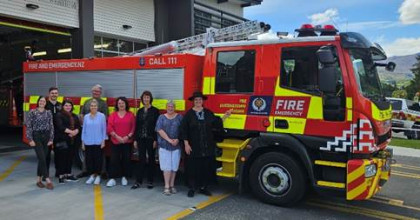Committee’s word carries weight
23 August 2024
A ban on the private use of fireworks in high-risk areas is an example of the fine work being done by Otago’s Local Advisory Committee (LAC).
Formed four years ago, the Otago LAC brings together people with a diverse range of skills and expertise to offer insights and guidance on community risks to Fire and Emergency New Zealand.
Residents’ concerns about the risks posed by setting off private fireworks came through the LAC and helped inform the decision in late 2022 to prohibit their use at the Queenstown Red Zone, Mount Iron, Albert Town Recreation Reserve, and other Otago spots considered to be at greatest risk.
‘Basically, the social licence was running out with fireworks,’ Otago LAC chair Megan McPherson says.
‘We pushed for this ban and Fire and Emergency took it seriously. It shows we have influence. Working with Fire and Emergency is a real partnership, and there was a result at the end of it.’
Deputy chair Helen Algar says the fireworks clampdown is ‘a piece of work that we’re really proud of.’
And there is plenty more for the LAC to do, on numerous fronts. The Committee has begun drafting its latest Insights Report. Two focus areas from its previous report are expected to remain part of the conversation: sustainable volunteerism and climate change.
‘We have the networks into our communities,’ Helen says. ‘We get a really good picture. We can bring forward specific vulnerabilities in terms of our communities - including those that are culturally diverse, isolated or vulnerable to climate change.’
The Otago LAC aims to support the District team by identifying trends and key insights while ‘keeping in our lane,’ Helen says.
A strong, positive relationship with our Community Risk Management team is valued by Committee members. So too is cross-agency collaboration.
‘I think Fire and Emergency has provided us with quite a unique mechanism to provide influence and insights back to the Board,’ Helen says, ‘and it’s up to us how we exercise that.’
To find out more about LACs, visit fireandemergency.nz/LACs.

The Otago Local Advisory Committee (L-R): Rachel Cooper, LAC Senior Advisor Cullum Peni-Wesche, Megan McPherson (Chair), Helen Algar (Deputy Chair), Neil Gillespie, Michelle Taiaroa-McDonald (former member), Hilary McNab, Vanessa van Uden, Mandy Mayhem-Bullock.













